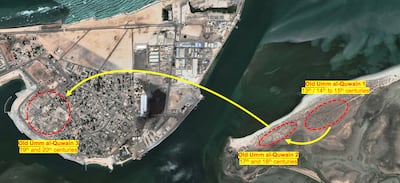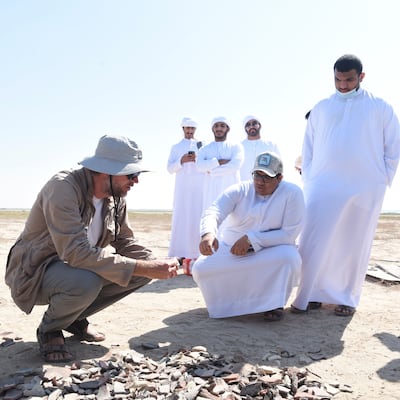A treasure trove of artefacts unearthed in Umm Al Quwain has pushed back the history of the settlement by as much as 500 years.
Pioneering work on the emirate’s Al Sinniyah Island — a previously unexplored area of huge historical significance opposite today's town — has uncovered the existence of two settlements with the oldest believed to be from the 13th or 14th century.
Previously UAQ was thought to have grown up around the fort established by Sheikh Rashid bin Majid Al Mualla in 1768 and the remarkable new findings radically reshape the history of the emirate.
“I am delighted by these discoveries,” said Sheikh Majid bin Saud Al Mualla, head of UAQ’s Tourism and Archaeology Department (TAD).
“We knew that the Al Mualla family first established itself in the area of present day UAQ around 250 years ago. These new finds on Sinniyah now add another 500 years to the history of our emirate.”

Unearthed artefacts on the island such as rare coins, pottery sherds and the remnants of a vibrant pearl trade are painting a picture of a cosmopolitan settlement plugged into wider trade routes from the Atlantic to Indian Oceans.
“We are finding objects from India, Africa, China, Japan and America,” said Dr Timothy Power, associate professor of archaeology at UAE University.
“We tend to think of the premodern emirates as an underdeveloped place with people living close to subsistence level but that’s not at all the case,” said Dr Power.
“These are communities engaged in an industry which was globally significant and produced sufficient money to support buying imports from across the globe. It was a massive, massive industry.”
Al Sinniyah sits between the UAQ peninsula and the Gulf coast and it protects the mangrove-fringed Khor Al Beida lagoon. All around its shores is evidence of occupation spanning at least 6,000 years, including sites from the Neolithic and Bronze Age periods as well as the major site of Ed Dur, a port settlement that traded with the Roman Empire 2,000 years ago.
The TAD has assembled a team from leading institutions including the UAE University, the Institute for the Study of the Ancient World at New York University, and representatives from the Italian Archaeological Mission. The work is also supported by the UAE’s Ministry of Culture and Youth, historian Peter Hellyer, who is an adviser on cultural heritage at the ministry, and several young Emiratis are working on the site. Work began this year.

The discoveries show how crucial the pearl trade was to these communities. The towns were located on the beach and are comprised of a small cluster of stone buildings made of beach rock or coral surrounded by larger suburbs of barasti huts. Beside them were found mounds known as oyster shell middens — essentially rubbish heaps for the discarded oyster shells.
“You can argue they are industrial waste like the slag heaps of Northern England,” said Dr Power.
Archaeologists believe the first town flourished between the 13th and 15th centuries. It can be dated by the presence of green-glazed pottery exported from China under the late Yuan and early Ming dynasties. This settlement is contemporary with the peak of Julfar in Ras Al Khaimah, which was the leading pearling centre of the lower Arabian Gulf during the later Middle Ages.
People then moved to the second town, with this site thriving from the 17th to early 19th century. This second town was destroyed on 18th January 1820 by the British during a conflict with the Qasimis of Ras Al Khaimah. A rare coin of Sheikh Sultan bin Saqr Al Qasimi, the powerful ruler of Ras Al Khaimah, has been discovered on the site. He signed the General Maritime Treaty of 1820 that brought hostilities to a close and laid the foundation for the modern UAE.
The ruins of the second town were described by a British naval survey in 1822 that noted that it had been abandoned in favour of modern-day UAQ. This constitutes the third town, which prospered between the 19th and mid-20th century, before the town expanded again to what is known today as UAQ.
The three towns are believed to belong to a single pattern lasting from the 13th or 14th century until today. This sequence is rare, archaeologists believe, since the remains of the historic towns in the Gulf have, in many cases, been obscured by development.
“This is phenomenally exciting,” said Dr Power. “It is very, very rare that we get that preservation.”
The work also aims to identify the public buildings such as forts and mosques at the heart of the historic community, and it is hoped the area can be opened to the public once ready.














